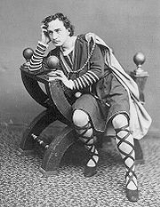What is the feminist interpretation of Hamlet?
replied to: jwalsh
Replied to: What is the feminist interpretation of Hamlet?
20th century feminists have focused on such elements as the depicted of women's gender roles in Shakespearean England.
replied to: giotto22
Replied to: 20th century feminists have focused on such elements as the depicted...
Hamlet loses faith in his mother, Gertrude, because he sees her as unfaithful to his father.
replied to: tbone
Replied to: Hamlet loses faith in his mother, Gertrude, because he sees her...
Feminist critics defend Ophelia, saying that the powerful men around her drove her mad.
replied to: jwalsh
Replied to: What is the feminist interpretation of Hamlet?
Well, it really depends on the feminist point of view. Some focus on Ophelia, while others focus on Gertrude.
Ophelia, however, is the most common. She doesn't really have much of a part until Act Four, when she goes mad. However, the way that Shakespeare portrayed her gives a lot of room for question - during one of her songs, she pretty much tells the story of a young woman losing her virginity to a nobleman, suggesting that she had sex with Hamlet after he promised to marry her.
She also says many things that point to this. For one thing, there is a scene where Ophelia hands random people bundles of rue, chattering on about how that person must "wear [their] rue with a difference." There's obvious symbolic meaning there, since rue symbolizes regret; however, Shakespeare is known for symbolism that suggests something else about the character.
Rue was well known for being poisonous and having highly abortive properties. Later on, Ophelia dies and it is suggested that she killed herself, which gives an explanation for the rue; however, there were tons of other herbs Shakespeare could have given her that would have done the job. In other words, the presence of rue suggests that Ophelia believed she was pregnant by Hamlet (which also explains why she went mad - the Valentine's day song suggests that Hamlet wouldn't marry her.)
If this is true, she was an orphaned girl who was pregnant without a husband or hope of a husband - one of the worst conditions to be in during Shakespeare's time, especially if said pregnant orphaned girl was a woman. If it wasn't true, she was still without her virginity, with a dead father, a lover who had told her to go to a convent and a brother who was on the other side of the world. Shakespeare intended for her to be collateral damage, but some feminists portray her as being too unequipped to handle such blows - partially due to how she was raised and who she was raised by.
There really isn't much you can say about Gertrude. She married Claudius about three months after her first husband, King Hamlet. Sometimes she's portrayed as being Hamlet's lover; other times she's portrayed as being a willing co-conspirator in her husband's murder. However, she never confessed to any sins when she drank the poisoned wine intended for Hamlet, which leads to a third explanation for her behavior: if she hadn't married Claudius, she would have lost every ounce of power she had when her husband had died. Such behavior was common in those times - Catherine the Great married for power, for example - and in Gertrude's case, it might have been necessary for both her survival and Hamlet's protection. Even if she had an inkling of what happened, making Hamlet Claudius's stepson would have served to protect him from his wrath until Hamlet was old enough to assume the throne under normal circumstances. She couldn't have predicted that Hamlet would seek vengeance for his father's death - or, in fact, that he knew about how it occurred, if she even knew what happened in the first place.
I hope this helps!
replied to: jwalsh
Replied to: What is the feminist interpretation of Hamlet?
It centers on the social position of women in the time, and the roles they have to play. Ophelia is ordered around by her father, her brother and her lover due to her inferior status. She is used as a tool for spying and she is violently rejected. Her love letters are also openly displayed to the King and Queen.
While many people see Gertrude as disloyal, for marrying her husbands' brother after his death, there may also be a need for this, as without this second marriage, she has no place in the court.

